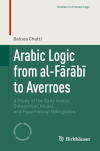- About MAA
- Membership
- MAA Publications
- Periodicals
- Blogs
- MAA Book Series
- MAA Press (an imprint of the AMS)
- MAA Notes
- MAA Reviews
- Mathematical Communication
- Information for Libraries
- Author Resources
- Advertise with MAA
- Meetings
- Competitions
- Programs
- Communities
- MAA Sections
- SIGMAA
- MAA Connect
- Students
- MAA Awards
- Awards Booklets
- Writing Awards
- Teaching Awards
- Service Awards
- Research Awards
- Lecture Awards
- Putnam Competition Individual and Team Winners
- D. E. Shaw Group AMC 8 Awards & Certificates
- Maryam Mirzakhani AMC 10 A Awards & Certificates
- Two Sigma AMC 10 B Awards & Certificates
- Jane Street AMC 12 A Awards & Certificates
- Akamai AMC 12 B Awards & Certificates
- High School Teachers
- News
You are here
Arabic Logic from al-Fārābī to Averroes

Publisher:
Springer
Publication Date:
2022
Number of Pages:
384
Format:
Paperback
Series:
Studies in Universal Logic
Price:
49.99
ISBN:
978-3-030-27465-8
Category:
Monograph
[Reviewed by , on ]
Jeff Oaks
03/20/2022
The study of logic had already enjoyed a long and varied history before the turn of the twentieth century when people like Boole, Frege, Russell, and Peano transformed it into the discipline it is today. Textual traditions in logic stretch back more than two thousand years to the works of philosophers in Greece, India, and China who independently developed principles of correct reasoning. The most complete account of logic in ancient Greece is preserved in Aristotle’s Organon, the title given to a collection of his writings. Later, when philosophers of the medieval Islamic world turned their attention to logic, they worked squarely in the tradition of Aristotle and his Greek commentators.
Saloua Chatti’s book gives a detailed account of the theories of logic of three principal figures writing in Arabic: al-Fārābı̄ (870-950/1 CE), Avicenna (Ibn Sınā, ca. 970-1037 CE), and Averroes (Ibn Rushd, 1126-1198 CE). These three not only worked at different times but also in distinctly different places. Al-Fārābı̄ spent his life between Iraq and Syria, Avicenna lived in Persia, and Averroes in Andalusia. The three philosophers also held different ideas about how one should approach the Aristotelian tradition and the study of logic in general. AlFārābı̄ for the most part followed Aristotle, and when he diverged from that path he often endorsed the modifications and interpretations of Alexander of Aphrodisias (ca. 200 CE) or he introduced innovations of his own. Avicenna is the most original of the three. He not only introduced refinements and corrections to Aristotle and the Greek and Arabic commentators, but he extended their work to produce a theory that was better developed, more complex, and which took on a more formal character. With Averroes, we find a return to the Greek master. Aristotle is routinely defended and the modifications of Greek and Arabic commentators are rejected.
The book covers in order three aspects of logic in these philosophers: categorical logic, modal logic, and hypothetical logic. (By ‘categorical’ Chatti of course intends categories in Aristotle’s sense and not modern category theory.) The chapter on categorical logic deals first with oppositions between categorical propositions and then with basic syllogistic reasoning. Modal logic covers syllogisms involving necessity and possibility, and in hypothetical logic, the syllogisms contain some conditional statement. Chatti also devotes some attention to methods of proof, noting in particular that al-Fārābı avoided proofs by reductio ad absurdum.
Throughout the book, Chatti situates the innovations and variations among the three philosophers in a broader context, often comparing them with what we later read in Jean Buridan, in the Port-Royal logic, or in other works both earlier and later. She liberally cites the secondary literature, much of which she herself has written. As an introduction to Arabic logic, she made a good choice by focusing on three particularly prominent thinkers, and not attempting to give an overview of developments across the works of the dozens of Arabic philosophers whose works are extant.
Familiarity with the logic of Aristotle is presumed. As the back cover states, “This unique study will appeal mainly to historians of logic, logicians, and philosophers who seek a better understanding of the Arabic tradition. It will also be of interest to modern logicians who wish to delve into the historical aspects and progression of their discipline. Furthermore, this book will serve as a valuable resource for graduate students who wish to complement their general knowledge of Arabic culture, logic, and sciences.”
Last, I should note that the reader of Chatti’s book will quickly notice by the phrasing of the sentences that she is not a native English speaker, and also that the book contains a few typographical errors. These issues are of no real importance. The book is perfectly readable as it is and serves as a solid and well-organized introduction to Arabic logic.
Jeff Oaks (oaks@uindy.edu) is a professor of mathematics at University of Indianapolis. His area of research is the history of mathematics, particularly Arabic algebra.
See the publisher's website.
- Log in to post comments




